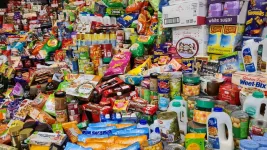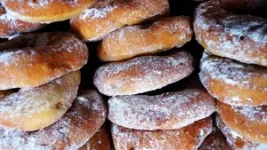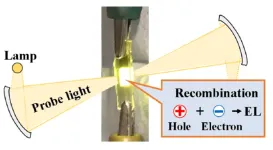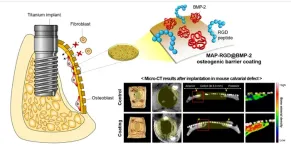(Press-News.org) Shoppers join food industry and health experts in backing UK plans to ban high fat, salt and sugar products from checkouts, store entrances and aisle ends
Consumers and retailers were asked about the impact of new government legislation aiming to restrict how unhealthy food is sold
Scientists behind investigation say ban can curb impulse buys that cause obesity – but warn of loopholes and limited resources that could undermine health benefits
A ban on selling junk foods from store entrances, aisle ends and checkouts should continue after a new study found the plans were largely backed by the British public and food industry.
Legislation to restrict the placement of products high in fat, salt and sugar (HFSS) was introduced by the UK government in October last year as part of efforts to tackle obesity.
More than 100 people across the UK’s food supply chain were interviewed for the investigation, which was led by researchers from University of Southampton and City, University of London, and funded by the National Institute for Health and Care Research (NIHR).
Investigation lead Professor Christina Vogel, Deputy Director of the Centre for Food Policy, City, University of London, labelled the plans a “world leading” move that could shift the UK away from unhealthy and unsustainable diets, if adopted alongside other anti-obesity legislations.
She said: “This novel food policy marks important changes that can help create healthier shopping environments for customers. But it is essential to monitor how well it is being implemented across all store types and identify what more is needed for it to have maximum benefit for everyone.”
The study, published in the journal BMC Medicine, found that retailers, manufacturers, consumers, enforcement officers and health representatives across England’s food system felt the legislation is a good first step towards tackling obesity.
UK Government Health Minister Neil O’Brien said the research shows consumers, retailers, and manufacturers back what the government is doing on tackling obesity.
He added: “Restrictions on the placement of unhealthy foods stop shops from using children and ‘pester power’ to hassle adults into buying things. But they also reduce children’s calorie consumption, driving down obesity, and could save the NHS over £4 billion. These reforms are ensuring healthier food is more widely available, easily accessible, and more visible in our shops – helping everyone to live healthier lives.”
The results did reveal concerns about the exemption of certain foods and businesses, the high cost of healthy products, and the possibility that some businesses may exploit loopholes to continue marketing nutritionally-poor products – which could weaken the intended effects of the legislation.
Dr Sarah Muir, from the MRC Lifecourse Epidemiology Centre at the University of Southampton, said: “The support from people across our food system demonstrates this government legislation is important and should be continued. To ensure businesses across the country can adhere to the new rules, all retailers and manufacturers need easy access to a tool that accurately measures the fat, salt and sugar content and other nutrients in products.”
The study also identified that smaller businesses need extra support to offer healthier foods while remaining financially secure. Local authorities who are working with businesses in their area to support compliance also need ring-fenced resources because their teams are already stretched.
Preeti Dhuria, also from the MRC Lifecourse Epidemiology Centre at the University of Southampton, added: “To achieve meaningful dietary change, the people we spoke to noted that this legislation will need to be refined over time to close loopholes, and that a long-term strategy targeting the pricing, marketing, advertising and reformulation of foods will be needed.”
Read the study in the BMC Medicine journal at bmcmedicine.biomedcentral.com/articles/10.1186/s12916-023-02726-9
END
British public back ban on selling junk foods at checkouts study shows
Removing 'impulse buy' foods that are high fat, salt and sugar supported by shoppers and retailers
2023-03-14
ELSE PRESS RELEASES FROM THIS DATE:
EPND launches its Cohort Catalogue, facilitating discovery of over 60 neurodegeneration research cohorts from 17 countries across Europe
2023-03-14
On 14 March, the European Platform for Neurodegenerative Diseases (EPND) launched its Cohort Catalogue. Featuring an extensive list of international cohorts across the neurodegenerative disease spectrum, the Cohort Catalogue is a central, open, accessible repository for researchers to discover ongoing studies and search metadata by disease area, biosample availability, imaging and cognitive data, and more.
The EPND consortium brings together experts in neurodegeneration research, data science, diagnosis and treatment from 29 public and private organisations. Funded by ...
Help Harry Help Others and Aston University join forces to develop pioneering treatment of brain tumors in children
2023-03-14
Birmingham based charity, Help Harry Help Others and Aston University researchers, are working together to develop a pioneering pre-surgical diagnostic tool, which could see the eventual outcome of children with brain tumours drastically improve.
Help Harry Help Others, which became a registered charity in September 2012 and marked its 10th anniversary last year, was founded by Georgie Moseley, following the passing of her son Harry. Despite fighting an inoperable brain tumour, Harry raised over £750,000 for cancer research in the last two years of his life, before he passed away ...
Machine learning helps researchers separate compostable from conventional plastic waste with ‘very high’ accuracy
2023-03-14
Disposable plastics are everywhere: Food containers, coffee cups, plastic bags. Some of these plastics, called compostable plastics, can be engineered to biodegrade under controlled conditions. However, they often look identical to conventional plastics, get recycled incorrectly and, as a result, contaminate plastic waste streams and reduce recycling efficiency. Similarly, recyclable plastics are often mistaken for compostable ones, resulting in polluted compost.
Researchers at University College London (UCL) have published a paper in Frontiers ...
Observations open door to improved luminous efficiency of organic LEDs
2023-03-14
Electroluminescence is the production of light with an electrical current, without relying on heat or chemical reactions. This makes electroluminescent lights reliable and highly efficient: they are used as backlights in digital watches and in the displays of Apollo space shuttle guidance computers. Like OLEDs, light-emitting electrochemical cells (LECs)—which emit light through electroluminescence—have undergone many technological advancements. Close examination of the processes that lead to luminescence is essential ...
Rice labs seek RNA programming for ‘smart’ antibiotics
2023-03-14
HOUSTON – (March 13, 2023) – Synthetic biologists at Rice University are embarking on a three-year project to create “genetically encoded antibiotics,” strands of RNA that bacteria will readily copy and share that will selectively kill only disease-causing, pathogenic bacteria.
“Most bacteria pose no danger to human health,” said James Chappell, an assistant professor of biosciences and bioengineering at Rice. “The question for us as synthetic biologists is, ‘Can we create genetic programs that move through microbial communities and precisely remove only the bad actors from those communities?’”
Thanks ...
Attracting stem cells and facilitating bone regeneration by adhesive protein
2023-03-14
One of the key factors of success in a dental implant is the condition of the periodontium around the implant. A higher long-term success rate of dental implants requires sufficient and healthy alveolar bone. In those cases where lack of alveolar bone renders setting an implant difficult, the bone should be regenerated sufficiently to receive the implant, whether before or during the implant surgery. Development of osteogenic barrier coating material for implants by a Korean research team is expected to improve the success rate of alveolar bone grafting.
Three research teams led by Professor Hyung Joon Cha of the Chemical Engineering ...
Thousands of native plants are unphotographed, and citizen scientists can help fill the gaps
2023-03-14
Scientists have documented plant species for centuries to help us understand and protect the incredible diversity of flora in our world. But according to new research, many have never actually been photographed in their natural habitats – and that’s a problem.
Researchers from UNSW Sydney and the Australian Institute of Botanical Science, part of the Royal Botanic Gardens and Domain Trust, surveyed 33 major online databases of plant photographs to examine the photographic record of Australian plant species. The findings, published in New Phytologist, reveal out of 21,077 native Australian vascular plant species, almost 20 per cent lack a verifiable photograph.
Lead ...
Study sheds light on concerning new trend in drug advertising: Patient influencers
2023-03-14
Patients-turned-social-media-influencers routinely offer prescription drug advice to their followers and often have close ties with pharmaceutical companies, according to new University of Colorado Boulder research.
But they also tend to have good intentions, the study found.
The study, published this week in the Journal of Medical Internet Research, provides some of the first insights into the burgeoning, loosely regulated world of so-called “patient influencers,” sharing findings from 26 in-depth interviews about why and how they do it.
“The bottom line here is that patient influencers act as a form ...
Checking children’s wellbeing: Before and after COVID-19
2023-03-14
A video game featuring a mystical character named Rumble has helped Griffith University researchers investigate how school kids fared following lockdown disruption.
Dr Jacqueline Allen from Griffith’s School of Criminology and Criminal Justice headed up the team looking at self-reported wellbeing in a sample of primary school-aged children in Queensland, Tasmania and Western Australia.
The team used an innovative video game called Rumble’s Quest, developed wholly within Griffith University, which measures the four key facets of wellbeing, as well as ...
Health: Mediterranean diet associated with decreased risk of dementia
2023-03-14
Consumption of a traditional Mediterranean-type diet – rich in foods such as seafood, fruit, and nuts – is associated with a reduced risk of dementia, reports a study published in BMC Medicine. Individuals with a higher adherence to a Mediterranean diet had up to 23% lower risk for dementia compared with those who had lower adherence to a Mediterranean diet.
Diet may be an important modifiable risk factor for dementia that could be targeted for disease prevention and risk reduction but previous studies exploring the impact of a Mediterranean diet have typically been limited to small sample ...
LAST 30 PRESS RELEASES:
A non-invasive therapeutic strategy for improving bone healing in aged patients
Molecule found to drive skin cancer growth and evade immune detection
Smokefree generation law could see English smoking prevalence drop below 5% decades earlier than expected
Heart disease risk factors appeared at younger age among South Asian adults in the U.S.
Paralysis treatment heals lab-grown human spinal cord organoids
US South Asians face elevated heart risk at age 45 despite healthier habits
DNA barcoding reveals the complexity of breast cancer liquid biopsies
Flagship whales facing climate-driven decline in Australia
Does a past abortion or miscarriage affect a woman’s risk of developing breast cancer?
Could a treatment redirect the body’s anti-viral immune response to target cancer cells?
How does universal, free prescription drug coverage affect older adults’ finances and behaviors?
Do certain factors affect life expectancy in people with spina bifida?
New study: Routine aspirin therapy prevents severe preeclampsia in at-risk populations
Afraid of chemistry at school? It’s not all the subject’s fault
How tech-dependency and pandemic isolation have created ‘anxious generation’
Nearly three quarters of US baby foods are ultra-processed, new study finds
Nonablative radiofrequency may improve sexual function in postmenopausal women
Pulsed dynamic water electrolysis: Mass transfer enhancement, microenvironment regulation, and hydrogen production optimization
Coordination thermodynamic control of magnetic domain configuration evolution toward low‑frequency electromagnetic attenuation
High‑density 1D ionic wire arrays for osmotic energy conversion
DAYU3D: A modern code for HTGR thermal-hydraulic design and accident analysis
Accelerating development of new energy system with “substance-energy network” as foundation
Recombinant lipidated receptor-binding domain for mucosal vaccine
Rising CO₂ and warming jointly limit phosphorus availability in rice soils
Shandong Agricultural University researchers redefine green revolution genes to boost wheat yield potential
Phylogenomics Insights: Worldwide phylogeny and integrative taxonomy of Clematis
Noise pollution is affecting birds' reproduction, stress levels and more. The good news is we can fix it.
Researchers identify cleaner ways to burn biomass using new environmental impact metric
Avian malaria widespread across Hawaiʻi bird communities, new UH study finds
New study improves accuracy in tracking ammonia pollution sources
[Press-News.org] British public back ban on selling junk foods at checkouts study showsRemoving 'impulse buy' foods that are high fat, salt and sugar supported by shoppers and retailers








